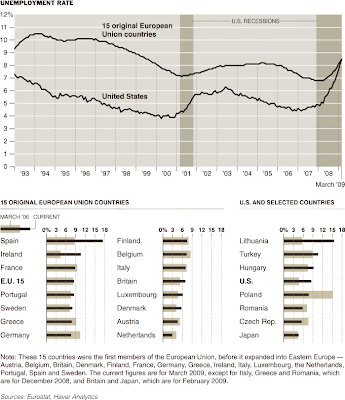A conversation with Paul Volcker
Bloomberg interview of Paul Volcker, arguably the most respected central banker. The interview was done a few weeks back.
Paul Volcker, “I would have never thought I would see this degree of government intervention…”
Unemployment: the US caught up with Europe
The unemployment rate in the US is likely to surpass Europe.
Peter Schiff wants you to get out of US dollar
The US dollar often moves in the opposite direction with the market during this crisis, i.e., when stock market is down, dollar is up. But Peter Schiff noted something has changed —we may have dollar, stocks and bonds decline at the same time. And he thinks inflation is coming.
Creditless recovery?
According to the research by Claessens, Kose and Torrones, economic recoveries can happen even without recoveries in credit market and house prices.
The observation can be summarized in the graph below:
One source of such recovery is consumption. But given that consumption is unlikely to have a quick rebound in this recession, they conclude that even economic recovery is possible, it will be slow and shallow.
Read the report of the research here.
What summer jobs for teens?
Mowing lawns? Or fixing computer for your friends’ parents?
A Federal Debt Road Trip:1900-2016
A very nice (and funny) video on the evolution of the federal debt (different from national debt, which includes debts from the states and private debt). According to the video, Obama administration will be increasing the federal debt at “174 mph”, almost tripling the speed of Bush Administration. No wonder Bill Gross is worrying about the US government may lose AAA rating.
Debate on US inflation prospect
A nice debate on inflation from Bloomberg video.
Arguments for deflation or inflation is not to worry:
>excessive capacity and output gap;
>debt deleveraging;
>rising unemployment;
Arguments for inflation (some are my own arguments):
>the Fed put too much money into the system, once economy recovers, the excess liquidity is hard to reverse and money velocity will snap back very quickly;
>the Fed is getting out of its normal monetary policy areas and widely engaged in credit expansions. This may comprise the Fed’s independence and the Fed may face pressure from the Congress not to raise rates giving rising unemployment rate, which is forecast to surpass 10%;
>the temptation of using inflation to erode debt (or monetizing debt);
>a divergence may appear: a slow gradual recovery in the economy (stagnation), and sharp rising of commodities prices, including oil (partly pushed up by vast energy needs in the faster growing emerging markets, especially China), leading to the 70s-like “stagflation”.



